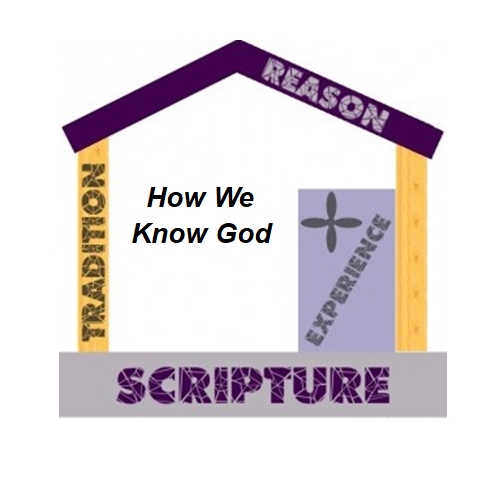
The “Wesleyan” Quadrilateral
- Some denominations base their beliefs on a creed. Like a single post in the ground. Members must believe very specific set of things to belong.
- We as United Methodists pride ourselves on our diversity. We affirm the value of various creeds (historic statements of belief from various Christian traditions)—see United Methodist Hymnal for examples—but allow for a more flexible approach.
- It’s helpful to envision a quadrilateral to “fence in” United Methodist beliefs.
- We agree on essential issues of Christian faith, but allow for a variety of opinions on more non-essential issues.
Quotes from John Wesley:
- “In essentials unity; in non-essentials liberty; and in ALL things charity”
- “As to all opinions which do not strike at the root of Christianity, we think and let think.”
- “To be ignorant in many things and to be mistaken in some in the necessary condition of humanity”
- CAUTION: We do not worship a quadrilateral, we worship God.
- The quadrilateral is a tool we can use to help flesh out our theology—what we believe about the nature of God and how God relates to our world.
- The quadrilateral identifies sources we use to help us make choices and criteria we should use to judge the soundness of our decisions and to seek guidance of the Spirit.
According to Wesley, the living core of Christian faith was:
- Revealed in Scripture
- Illumined by Tradition
- Vivified in Personal Experience
- Confirmed by Reason.
The close relationship of tradition, experience, and reason appears in the Bible itself. Scripture witnesses to a variety of traditions, some of which reflect tensions in interpretation with the early Judeo-Christian heritage. However, these traditions are woven together in the Bible in a manner that expresses the fundamental unity of God’s revelation as received and experienced by people in the diversity of their own lives. —United Methodist Book of Discipline, 2004, Paragraph 104, page 79.
Scripture
- What does Scripture say about a given issue or situation?
- Wesley saw Scripture as first among equals as it reveals the word of God.
- Wesley gave Scripture final authority on matters of faith and practice.
- This is where we should always start and finish our study.
PROBLEM: Sometimes Scripture is frustratingly quiet about particular subjects. We may wish that we had more guidance on some subjects than is actually provided but we should avoid reading more into the Scriptures than is actually there.
The other sides of the quadrilateral help us grapple with the grey areas as it were; they give a framework to use to help construct answers to questions we face.
Tradition
- How has this Scripture been interpreted/applied over 2000 years of church history?
- Just like in any field of study, the development of theology doesn’t start over every generation—we build on what has gone on before.
- Wesley was an Anglican, so he particularly drew on the tradition and history of Anglican church and the early/apostolic church.
- The United Methodist church uses modified versions of standards that originally developed in the Anglican Church—e.g., the Book of Common Prayer, homilies.
- Tradition gives us a means to test and see if our interpretation/application of scripture matches with the interpretation/application of Christians throughout the centuries.
- It is often amazing to see how similar the issues faced by the Church in centuries past have in common with the issues the Church faces today.
Experience
- Does my experience of God confirm what I learn from Scripture and tradition?
- Head knowledge of God was never sufficient to Wesley; he stressed the need to know or experience God personally. (Doesn’t necessarily mean emotion or intense feelings.)
- Our individual experience of God is shaped by the time and place we live (our culture) and is just one of many valid expressions of God.
- Wesley focused more on collective experience than individual experience—dialogue.
- Wesley valued collective wisdom of the present as well as collective wisdom of the past—hence the value of tradition for connecting us with past experience.
Reason
- How do I interpret/synthesize information from Scripture, tradition, and experience?
- Wesley advocated bringing together knowledge and vital piety.
- Reason can’t lead to knowledge of God, but allows us to understand/interpret scripture, tradition, and experience, so that we can’t really know God without reason.
- Reason is not a source of information; reason is a tool to interpret information.
- Reason and faith are not incompatible—i.e., it is not necessary to check our brain at the door when we enter a United Methodist Church.
